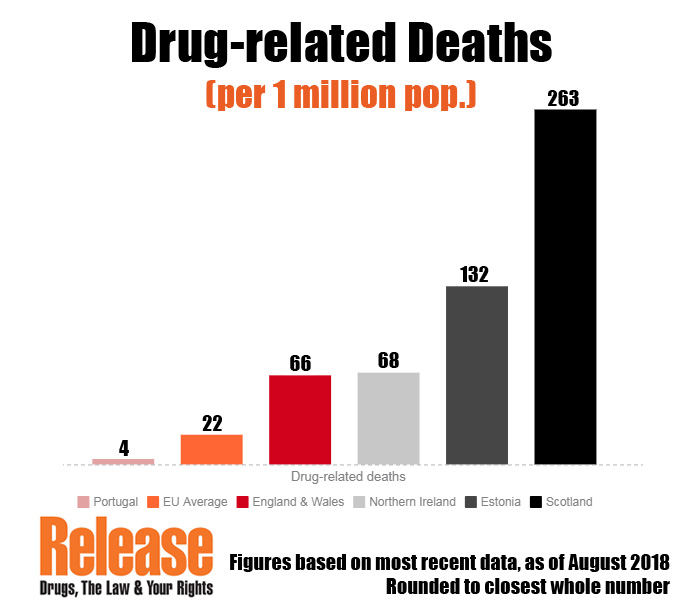Drug-related deaths in Scotland have reached the highest figure ever recorded, and the rate of such deaths may now be the highest in the EU. This highlights the urgent need for harm reduction measures, such as the establishing of a safe drug consumption room.
Data published on August 15 by the National Records of Scotland suggest that Scotland now has the highest rate of drug-related deaths of any country in the European Union. Across Scotland, the report says, there were 160 drug-related deaths per one million people in 2016. This compares with an estimated 65.8 per million in England and Wales, and a European average of 20.3 per million. The European Monitoring Centre for Drugs and Drug Addiction estimates that the EU country with the closest rate of drug-induced deaths is Estonia, with 102 such deaths per million adults.
Drug-related deaths in Scotland are rising at an unprecedented rate; the number rose by 23 per cent between 2015 and 2016, reaching 867 – the highest figure ever recorded. Over 54 per cent of these deaths involved the use of heroin or morphine.
While there have been increases in drug-related deaths among most age groups, the rises are particularly pronounced among older groups. Between 2000 and 2016, such deaths among people aged 45-54 increased from 16 to 213, the figure among 55-64 year olds rose from 3 to 66. The median age of drug-related deaths in Scotland has steadily increased over the past 20 years; from 28 in 1996, to 34 in 2006, to 41 in 2016.
This older cohort, dubbed the Trainspotting generation, are dying in greater numbers without significant media or political coverage of their deaths. Niamh Eastwood, executive director of Release, the UK's centre of expertise on drugs and drugs law, described how “if a 40-year-old man who lives in poverty and deprivation dies, that’s not going to make news. This group is incredibly marginalised and their deaths don’t seem to attract the same attention”.
To reduce these rising deaths among people who use heroin and morphine, particularly impoverished marginalised groups, a safe drug consumption room (DCR) is set to be established in Glasgow. DCRs save lives by ensuring that people who use drugs do so in the company of medical professionals who can provide sterile injection equipment, offer harm reduction advice, and – when necessary – administer naloxone, an overdose antidote. There is not one recorded instance of anyone dying from a drug overdose in any DCR worldwide.
DCRs are also beneficial for people who do not use drugs as they reduce discarded drug litter on the streets, reduce the spread of infectious diseases like HIV, improve broader access to emergency services, and allow police to concentrate on serious crimes.
The location of Glasgow for Scotland’s first DCR is no accident. The Greater Glasgow and Clyde area has the highest number of drug-related deaths of any NHS Board Area in Scotland, an unfortunate designation it has consistently held for the past decade. While the area has a higher population than any other in Scotland, this is not the reason; it also has the highest rate of drug-related deaths – with 170 such deaths per one million people between 2012 and 2016.
The vast majority of Glasgow's drug-related deaths, 225 of the 257 total, were related to opioid use – with 195 involving heroin, morphine, methadone, or buprenorphine. This further illustrates the importance of the city’s upcoming DCR, as well as the need for more such facilities across Scotland.
While England and Wales are experiencing a public health emergency in relation to drug-related deaths, the situation in Scotland is markedly worse. The eventual introduction of Glasgow’s DCR will alleviate some of the harms that drugs – particularly opioids – may pose, but a wider package of harm reduction measures must be implemented. In addition, the situation is being exacerbated by the continued criminalisation of people who use drugs, as the associated stigma dissuades people from seeking help or advice.
Authorities in Scotland, and elsewhere in the UK, may do well to consider Portugal's approach. Portugal, which decriminalised the possession of all drugs in 2001, has a drug-related death rate of 5.8 – one of the lowest in Europe.


